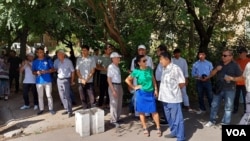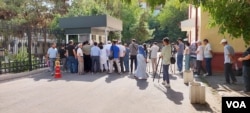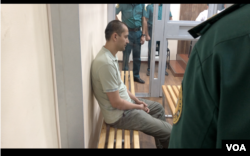Two journalism trials taking place in Uzbekistan this month have put issues of media freedom and ethics front and center.
In court are a media manager, government press officers and a blogger who regularly covered political and socioeconomic issues. If convicted, all could be handed lengthy prison terms.
“Both cases involve passionate reporters and bloggers who, believing in President Shavkat Mirziyoyev’s reforms, launched critical platforms, but have found themselves criminally indicted,” Sevdora Latipova, a freelance journalist, told VOA.
Latipova is encouraging others in the media “to stay calm but to professionally push for transparency and cover the process accurately.”
In the first case, Khurshid Daliyev, founder of a news website Human.uz and Mavjuda Mirzayeva, who served as the head of the labor ministry’s press service, are standing trial alongside two others on accusations including defamation, extortion and tax evasion.
According to a 360-page investigation report, Daliyev, who is known for blogging about Uzbekistan’s banking industry, led a “criminal ring” with Mirzayeva, Siyovush Hoshimov, a communications director at the state oil and gas holding, and Daliyev’s 19-year-old assistant Ahmadullo Ahmadjonov.
The group is alleged to have used a Telegram channel named Kompromatuzb to extort money from officials, state entities, and businesses by threatening to release compromising information.
Separate from that case, a blogger named Abduqodir Muminov appeared in a Tashkent court this week on charges of violation of privacy, extortion, fraud and bribery.
Muminov made a name with his YouTube channel “Ko’zgu” or Mirror, which focused on the country’s justice system.
According to the indictment, the blogger demanded that businesses pay him to refrain from publishing damaging information. But some supporters believe the prosecution is connected to Muminov’s criticism and reporting. If convicted, the 33-year-old could face up to 20 years in prison.
Despite conflicting reports on their pleas, the defense lawyers insist that all five deny the charges.
The Kompromatuzb hearings are closed on defendants' request, while the judge has limited cameras and observers in the courtroom for Muminov's proceedings.
“We must believe in justice and hope for the best," Human.uz chief editor Muslim Mirzajanov told VOA while speaking outside the court last week. "It’s wrong to speculate on what’s driving the defendants' actions.”
Authorities confiscated computers and servers from the newsroom and Human.uz has had to reduce its operation.
“About 50 people worked in Human.uz and related platforms. We had to let them go. Human.uz still offers some news items but we are not able to produce multimedia content, since we have no revenue,” Mirzajonov told VOA.
But, he added, “We must believe in justice and hope for the best. It’s wrong to speculate on what’s driving their actions.”
Briefly detained with Daliyev in January but released without charge, Mirzajonov is currently fighting a different criminal case related to Human.uz’s sister outlet Sof.uz, which the financial company Anorbank accuses of defamation.
Media trust
The nature of the charges in the Daliyev case has brought a measured response from civil society.
Still, some experts have expressed concern over the way the case is handled.
Human rights lawyer Steve Swerdlow, who heads a political prisoners project at the University of Southern California, said the lengthy pre-trial detention, raids and confiscation of equipment raise questions.
“Given Uzbekistan’s long record of suppressing media freedom, prosecutors should take extra care to ensure the detainees are afforded their full due process rights and that the case does not have a chilling effect on free speech in the country,” he said.
Others say that in Uzbekistan anyone who works to expose corruption is at risk of prosecution.
Watching back-to-back trials featuring journalists, Mirzajonov said that the system can be unfair but urged the public, especially his peers, to view it with caution and care.
“Some media outlets jumped to accusing me of being a criminal simply because I was detained back in January. We must know the difference between someone suspected or charged with a crime and who is found guilty. This is necessary for professional and reliable coverage,” he said.
Neither Mirzajonov nor his news website Human.uz is implicated in the case.
Beruniy Alimov, founding director of Tashkent-based New Media Education Center, which offers training in journalism and communications, sees the “current turbulence in the sector as natural.”
“We have a right to fail and make mistakes sometimes. The most important thing, however, is to identify where we go wrong, correct our ways, and be honest with our audiences,” he said.
“One colleague’s offense or misconduct can affect the entire media community and obviously trigger heated discussions about all of us,” Alimov added.
Despite some challenges and distrust in the system, journalists must defer to the relevant authorities, he said. “No one can guarantee that no media personality will ever get suspected of any crime. Don’t we want to believe that no one is above the law?”
For Karim Bahriyev, a lawyer and former lawmaker, bringing charges of extortion, fraud and financial felonies against the press is nothing new. “If these journalists confessed without pressure and torture, then I know that the honest and hardworking segment in our field don’t approve such acts.”
But, said Bahriyev, there are some among Uzbek journalists and bloggers who earn a salary or rewards by promoting the government’s agenda.
Some use information they find to try to intimidate others, thus making a living, which is illegal, Bahriyev said. Others try to report the truth, which brings the risk of retaliation and no reward.
Gulnoza Khusanova, the chief editor for the broadcaster UzReport TV, said the cases reflect the current media environment, adding, “I hope our industry and colleagues learn lessons from these trials.”
A verdict in either case is not expected quickly.
This story originated in VOA’s Uzbek Service






